
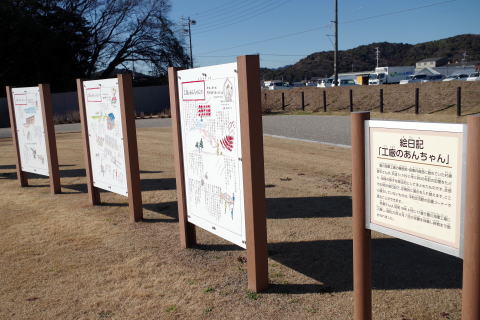
豊川海軍工廠跡地=平和公園(愛知県豊川市平和交流館)
旧日本海軍の航空機や艦船などが使用する機銃とその弾丸の主力生産工場として、1939年(昭和14年)12月15日に開庁した豊川海軍工廠があった場所。終戦間際の1945年8月7日、アメリカ軍のB29爆撃機による空襲により、2,500人以上の方々が犠牲となった悲しい歴史が刻まれた場所でもある。
豊川市では、戦後50周年の平成7(1995)年に平和都市宣言をし、「戦争の惨禍を防止し、恒久平和を実現することが、私たち市民の願い」であり、「歴史上かつてないほど多くの犠牲者を出したこうしたことが、なぜ起きたのか、ともに考え、子孫に語り継いでいかなければならない」ことをうたっています。その思いのもと、悲しい歴史が刻まれたこの場所で戦争の悲惨さと平和の尊さを伝えることを目的として、豊川海軍工廠平和公園を整備した。(豊川市平和交流館リーフレットより)
平和公園内には、豊川海軍工廠の建物や防空壕跡などの当時を偲ぶ遺構、海軍工廠の歴史・戦争遺跡について学ぶ平和交流館などがある。
平和交流館では、豊川海軍工廠の歴史や戦争遺跡の開設展示、ボランティアによる工廠の語り継ぎ活動を行っている。
私のなかで豊川というと、頭に浮かぶのは豊川稲荷神社だったが、館内のビデオで当時の海軍工廠と空襲の模様を観ることで、改めて太平洋戦争終戦間際の8月7日に豊川市の空襲の被害を知ることとなった。
社会教育(平和教育)として後世に残す為に、2018年にこの施設を造り戦争遺跡を整備し、一般公開した豊川市に感謝したい。
Toyokawa Naval Arsenal Ruins = Peace Park
(Toyokawa City Peace Exchange Center, Aichi Prefecture)
This is
the site of the Toyokawa Naval Arsenal, which opened on December 15, 1939, as
the main production factory for machine guns and bullets used by the former
Japanese Navy's aircraft and ships.
It is also
a place that has a sad history: on August 7, 1945, near the end of the Pacific
War, more than 2,500 people were killed in an air raid by American B-29
bombers.
In 1995,
the 50th anniversary of the end of the war, Toyokawa City declared itself a
city of peace, stating that ``it is our citizen's desire to prevent the scourge
of war and realize lasting peace,'' and ``to prevent the scourge of war and
realize lasting peace.'' "
We must
all think together about why something like this happened, which caused so many
victims, and pass it on to our descendants."
With this
in mind, the Toyokawa Naval Arsenal Peace Park was created to convey the misery
of war and the preciousness of peace in this place with a sad history. (From
Toyokawa City Peace Exchange Center brochure)
Inside
the Peace Park, there are remains of the Toyokawa Naval Arsenal, such as
buildings and air raid shelters, as well as the Peace Exchange Center, where
you can learn about the history of the naval arsenal and war ruins.
At the
Peace Exchange Center, the history of the Toyokawa Naval Arsenal and war ruins
are exhibited, and volunteers carry out activities to pass on the story of the
arsenal.
I would
like to thank Toyokawa City for building this facility in 2018, maintaining the
war ruins, and opening it to the public in order to pass it on to future
generations as social education (peace education).
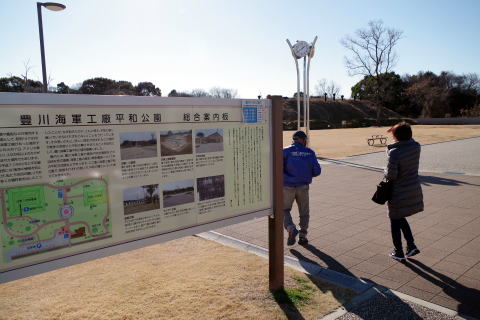
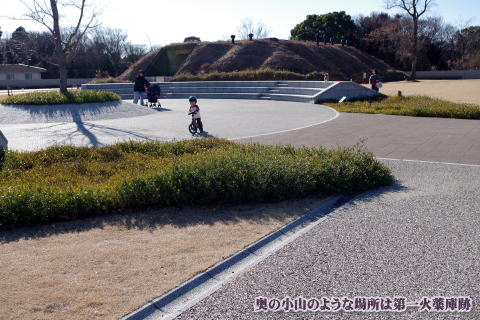
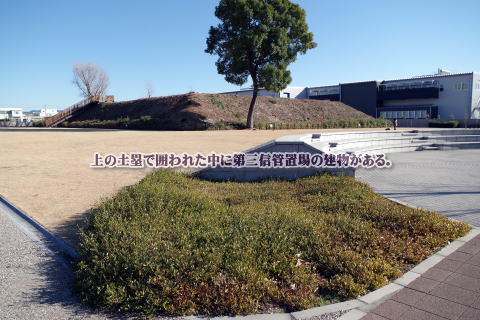
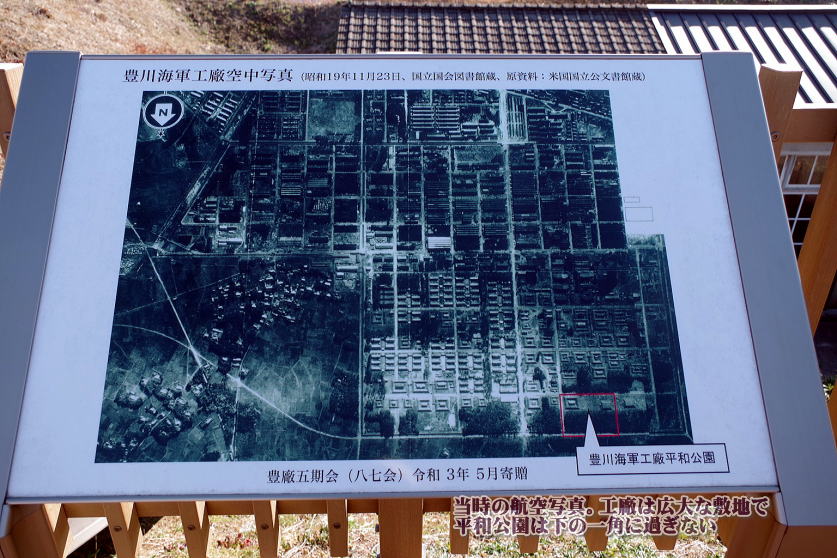
供養塔:豊川稲荷神社の西側に、空襲で犠牲となった工廠従業員らを慰霊するため1946年に建立されて、台座には犠牲者の名前が刻まれている。毎月7日と20日に豊川海軍工廠生存者の会「八七会」の会員と有志らによって、供養活動や清掃奉仕が行われている。
Tower dedicated to the
victims:
It
was erected on the west side of Toyokawa Inari Shrine in 1946 to commemorate
the spirits of the factory workers who died in the air raid, and the names of
the victims are engraved on the pedestal. On the 7th and 20th of every month,
members and volunteers of the Toyokawa Navy Yard Survivors' Association,
``Hachichi-kai,'' hold memorial services and cleanup services.
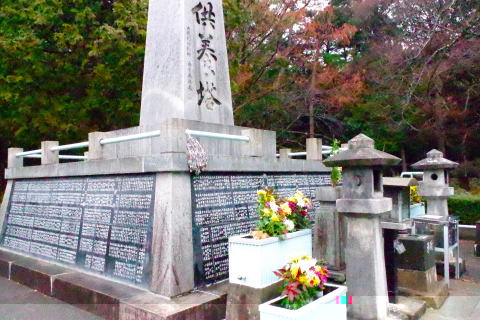

<平和公園内の戦争遺跡><War ruins in Peace Park>
旧第一火薬庫(豊川市指定史跡):豊川海軍工廠の当時の建物で、火薬を保管した施設で二部屋ある。建物の構造体に土をかぶせてあり、小山のような外観である。
Former No.1 Gunpowder
Storage:
This
is a building from the Toyokawa Naval Arsenal at the time, and is a facility
where gunpowder was stored, and it has two rooms. The structure of the building
is covered with earth, giving it the appearance of a small mountain.

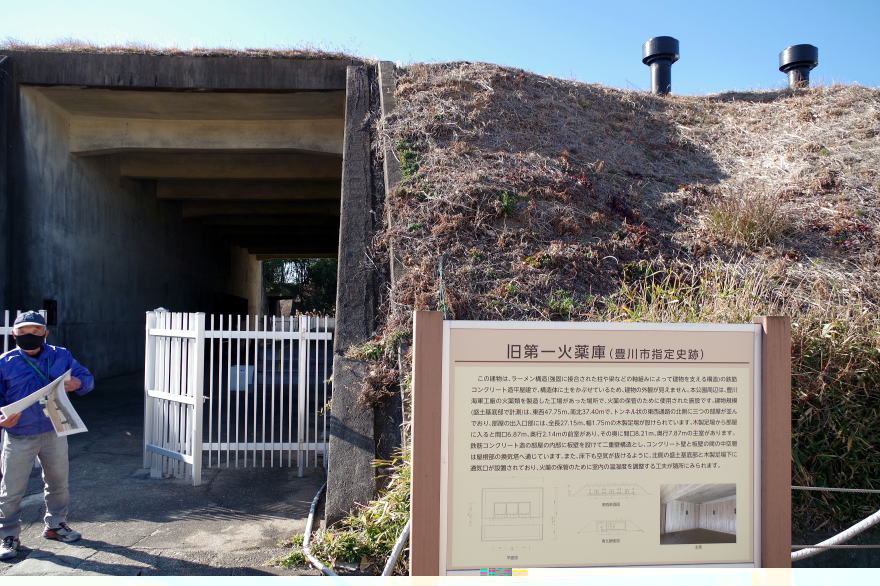

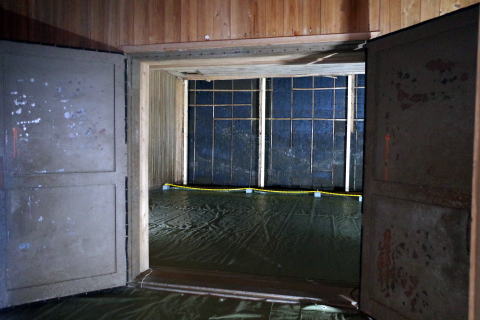
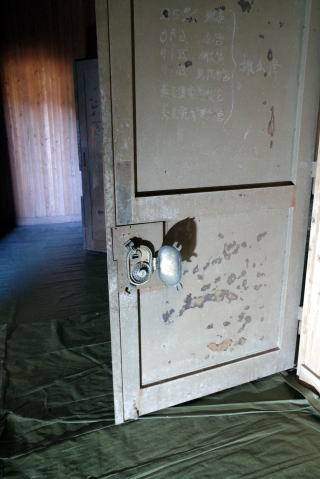
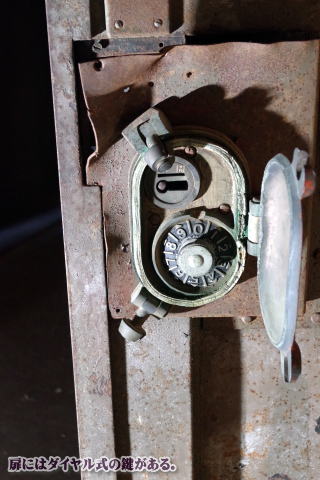
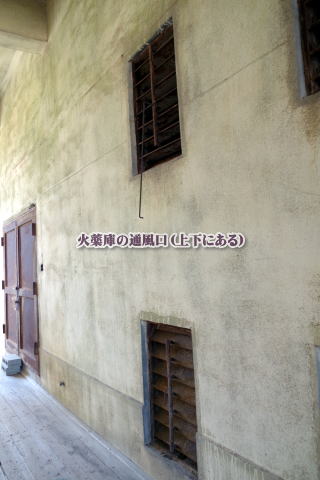

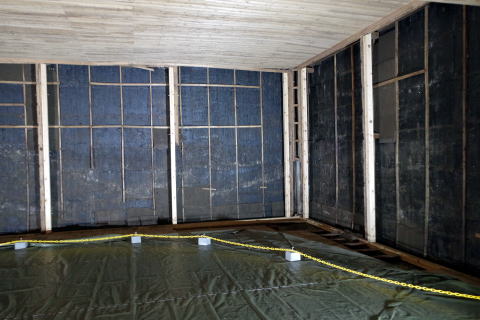
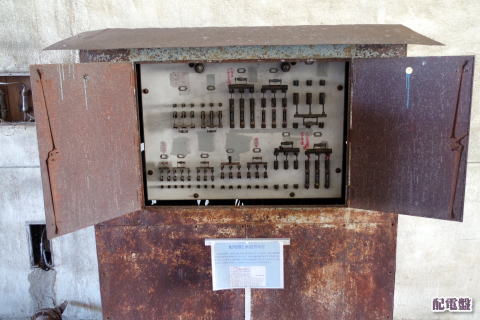



旧第三信管置場(豊川市指定史跡):こちらも豊川海軍工廠の当時の建物で、信管(弾薬の起爆装置)を保管した施設。爆発事故が起きた際に周囲に被害が及ばない様に建物の周囲を高さ5mの土塁で囲んでいる。
Former No. 3 fuze storage
area:
This
is also a former building of the Toyokawa Naval Arsenal, and is a facility
where fuses (detonators for ammunition) were stored. The building is surrounded
by an earthwork to prevent damage to the surrounding area in the event of an
explosion.


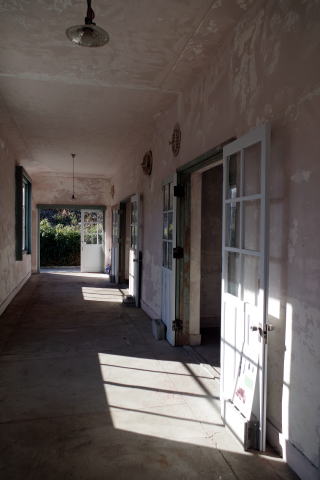
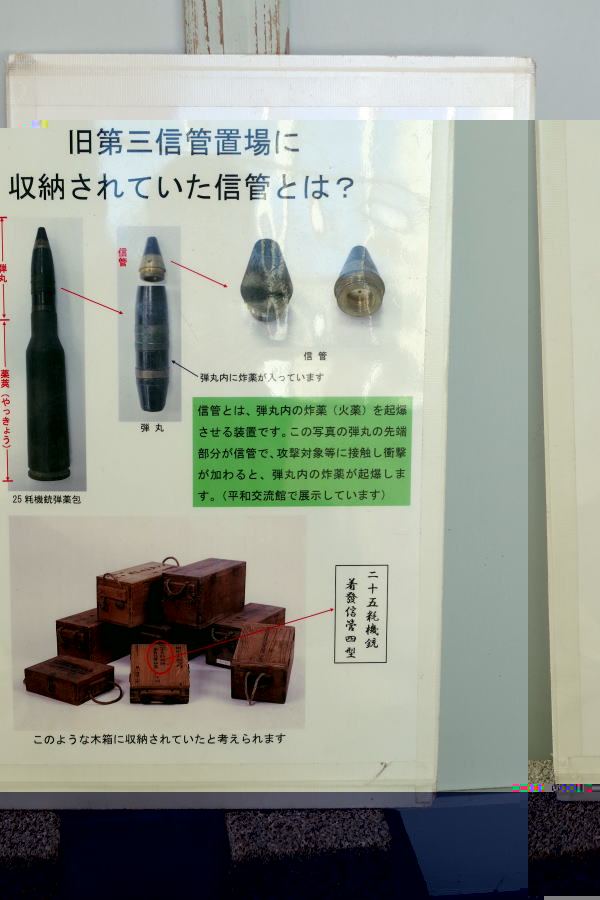

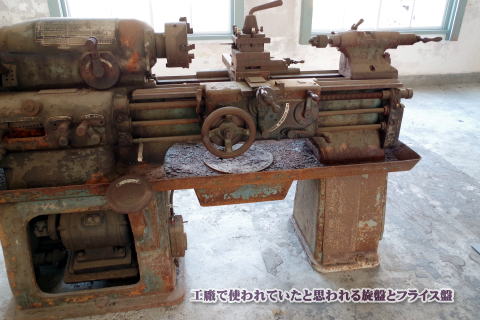
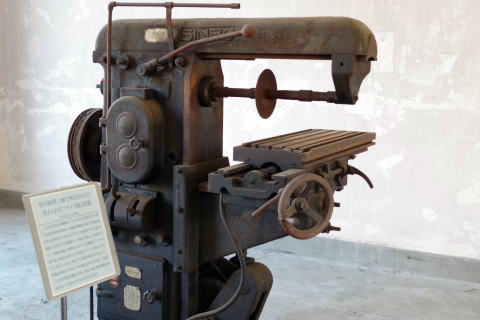
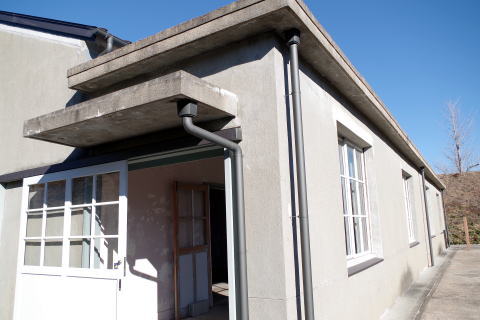


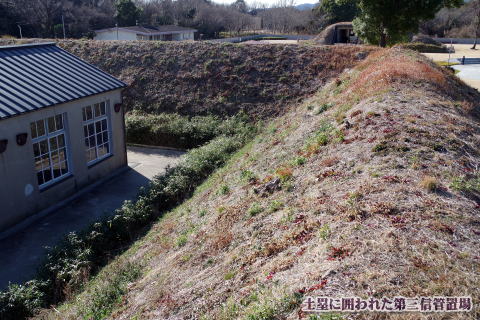
土塁と排水路:工廠の敷地には土塁がめぐり外側には排水路が掘られていた。工廠はこの土塁と排水路によって周囲と画されており、工廠への出入りは正門・西門・北門・東門などに限られていた。さらに土塁の上には鉄条網が張り巡らされていた為、空襲時に逃げられず多くの犠牲者がでた。
Earthworks and drainage
channels:
Earthworks
surrounded the factory grounds, and drainage channels were dug outside. The
arsenal was separated from the surrounding area by these earthworks and
drainage channels, and access to the arsenal was limited to the main gate, west
gate, north gate, and east gate. Additionally, barbed wire was placed over the
earthworks, making it impossible to escape during air raids, resulting in many
casualties.
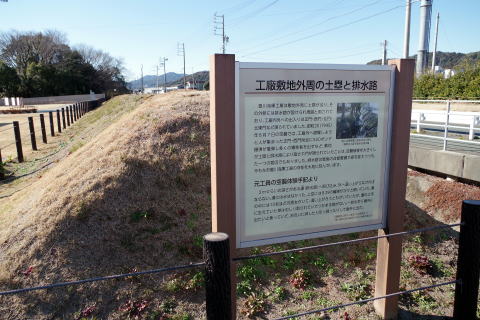
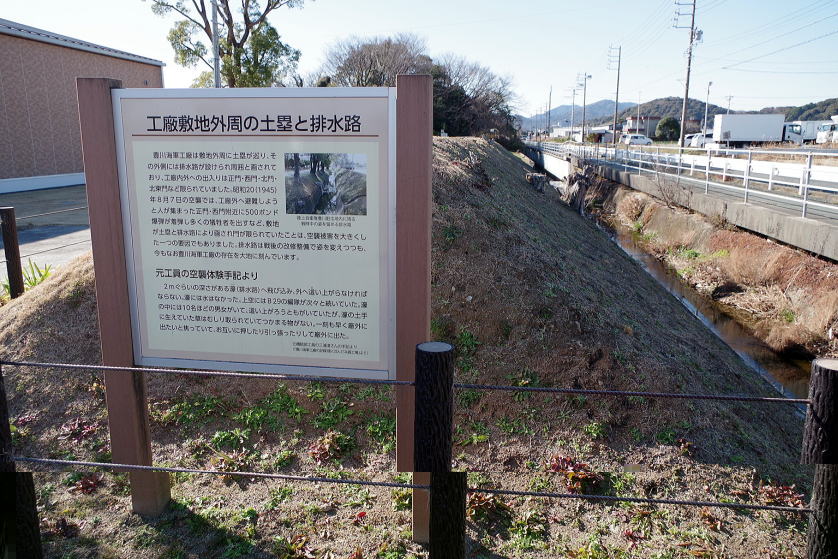
500ポンド爆弾被弾跡:1945年8月7日の空襲時に落ちた爆弾の跡。
500 pound bomb impact trace:
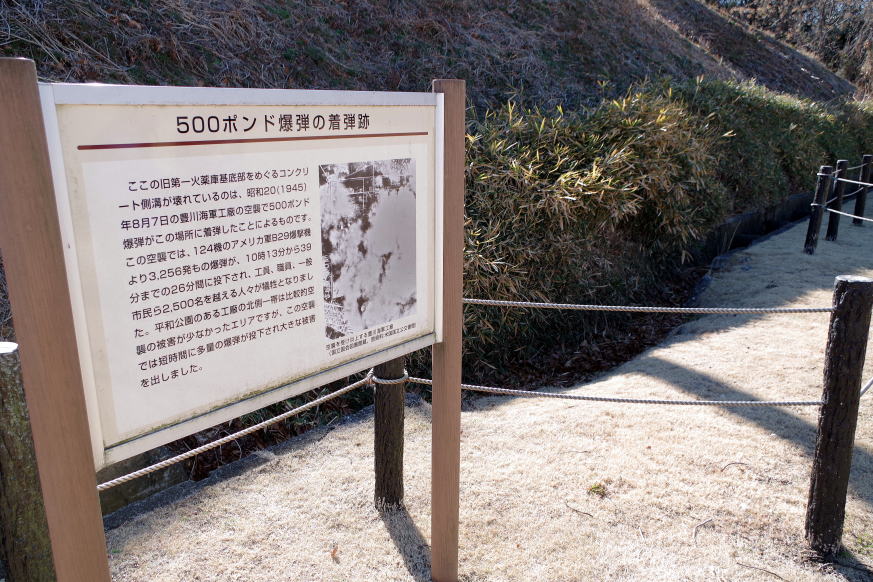

防空壕跡:素掘りの小型防空壕跡3基が現状保存されている。防空壕というよりも、いわゆる塹壕である。
Air raid shelter ruins:
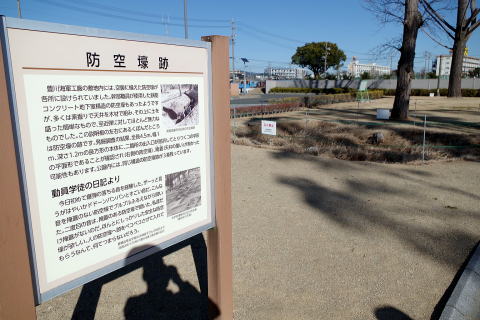

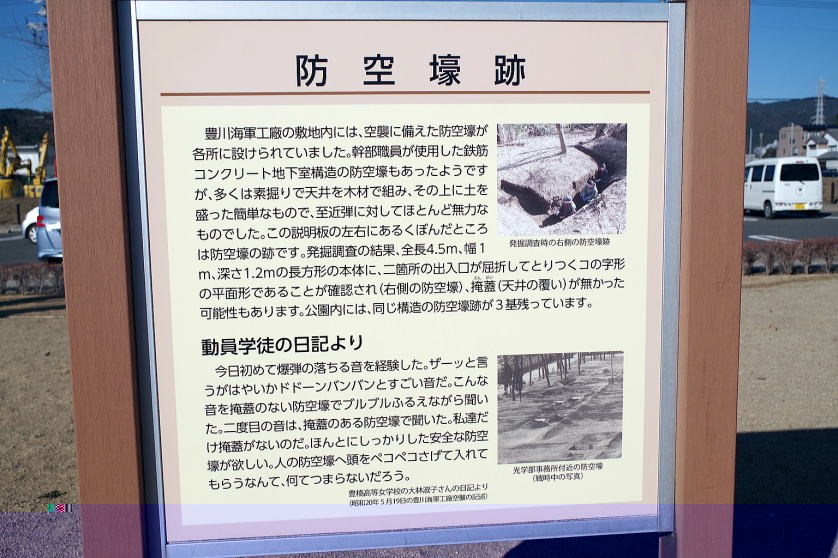
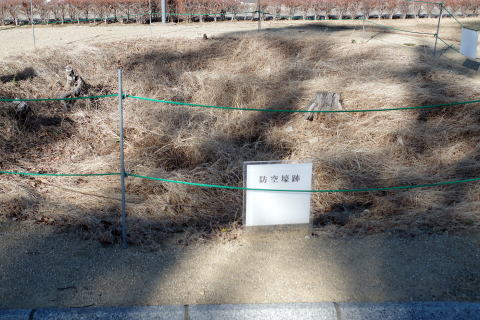
街路灯:当時に使用されていた街路灯8基が、元の位置及びその近くに保存展示されている。
Street light:
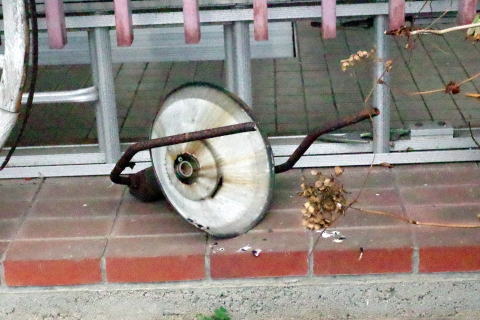
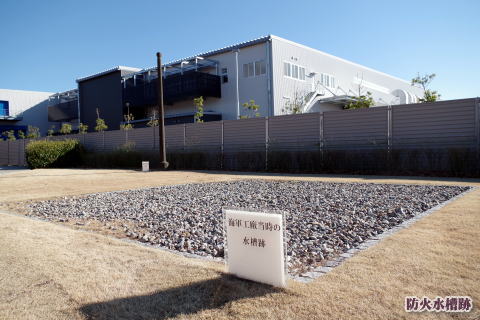


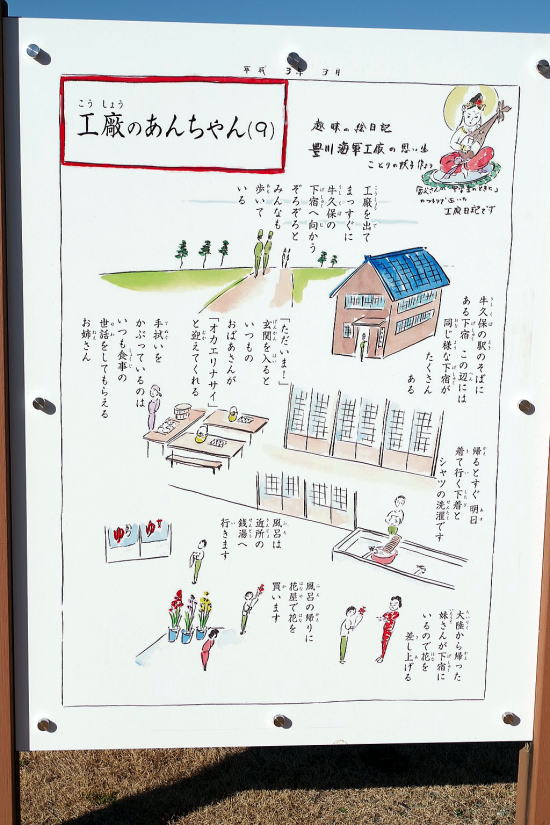
<名古屋大学豊川フィールド内の海軍工廠遺構> 2024.1.20
<Naval Arsenal ruins located within the Toyokawa Branch of Nagoya University
旧第二火薬庫:第一火薬庫と同じで火薬を保管した施設で構造・規模も同じ。
Former Second Gunpowder
Storage:
It
is the same facility that stored gunpowder as the No. 1 Gunpowder Depot, and
has the same structure and size.
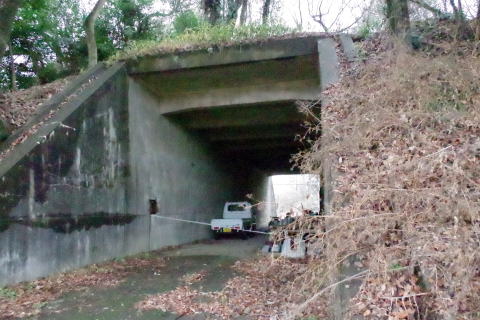

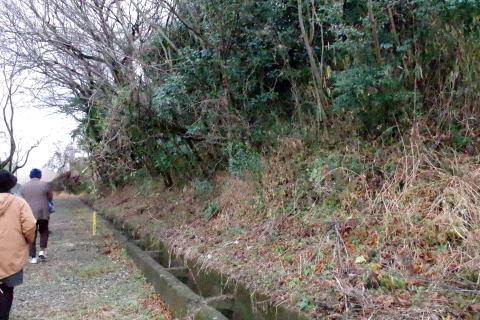
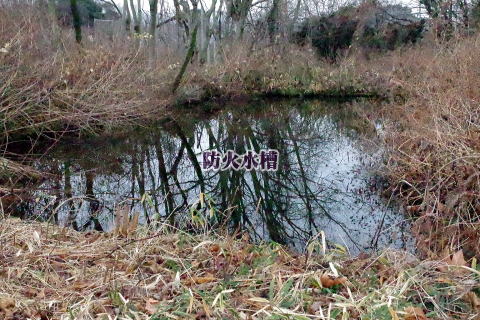
換気塔(第二火薬庫上部)と通気口(第二火薬庫下部):室内を喚起する為に上部と下部に設置されている。
Ventilation tower (upper
part of the second powder storage) and vent (lower part of the second powder
storage)
They
are installed at the top and bottom to vent indoor air.
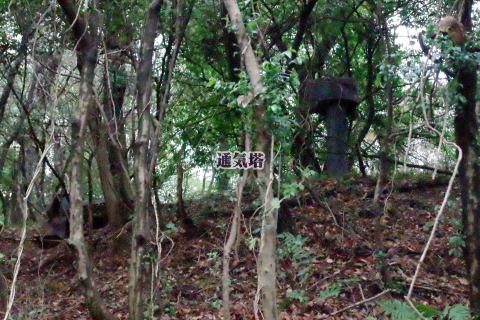

第三火薬庫鉄扉:内部構造は第一・第二火薬庫と同じだが一部屋のみ。写真の鉄扉には銃弾痕とみられる跡が残っている。
Third gunpowder storage iron
door
The
internal structure of this gunpowder storage is the same as the first and
second gunpowder storage, but only in one room. The iron door in the photo
shows what appears to be bullet holes.

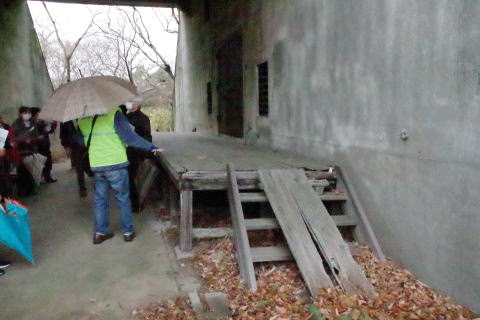
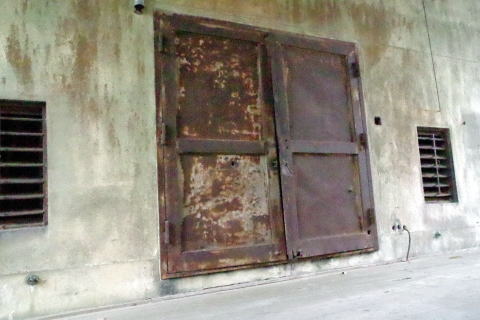
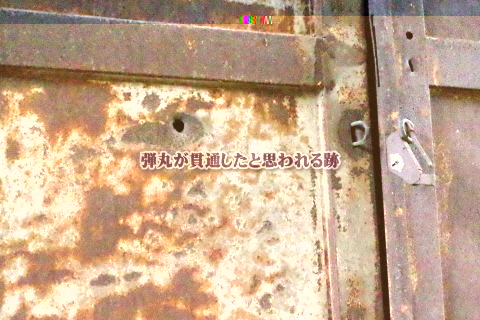
第三窒化鉛製場跡:建物の瓦礫が散乱しており、1945年8月7日の空襲で直接被害を受けたものと考えられる。周りを土塁で覆われ、出入りに使うトンネルだけが残っている。
Third lead nitride factory
ruins
The
building's rubble is scattered about, and it is thought that it was directly
damaged in the air raid on August 7, 1945. It is surrounded by earthworks, and
only the tunnel used for entry and exit remains.

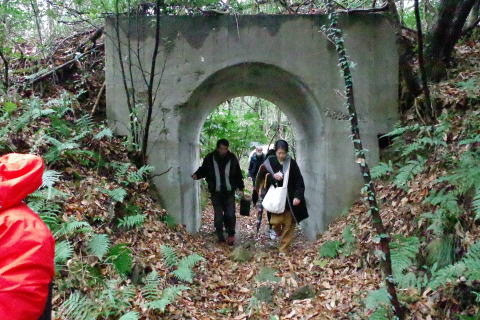
原料置き場:被害を受けたレンガ積みの建物でセメント壁面がむき出しになっており、空襲時の様子を今に留めている
Raw material storage area
The
cement walls of the damaged brick building are exposed, giving us a glimpse of
what it looked like at the time of the air raid.
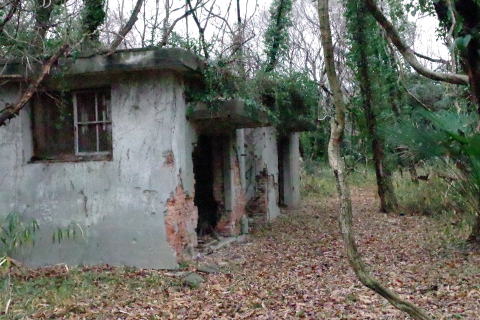
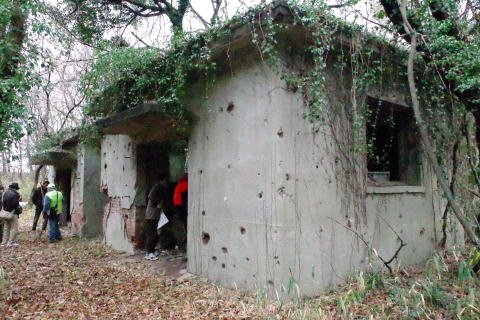
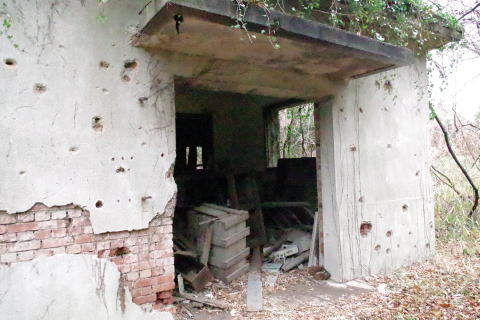

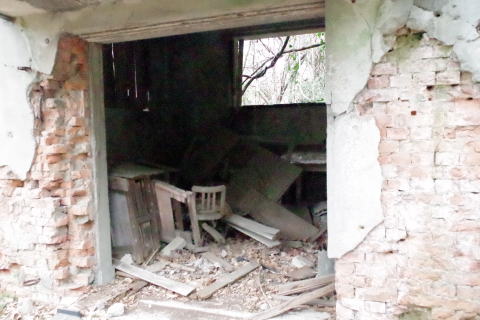
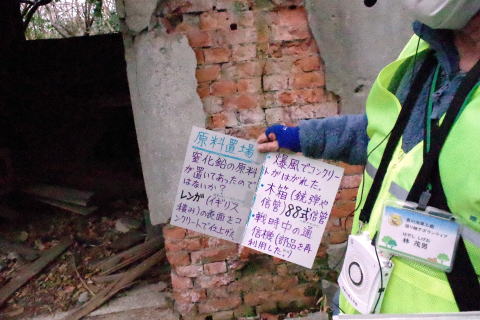
便所:空襲時に被害を受けた便所。当時では珍しかった水洗トイレ。小便器の高さが、今より低いのは当時の体格の違いか⁉
Toilet
A
toilet damaged during an air raid. Flush toilets were rare at the time. Is the
reason why the urinals are lower than they are now due to the difference in
physique back then?
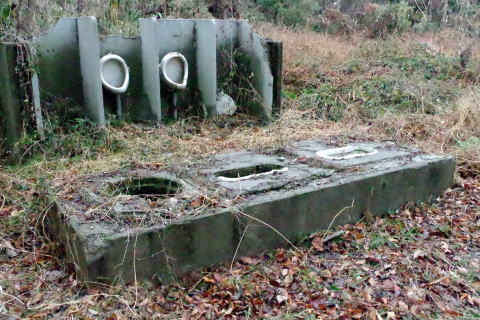
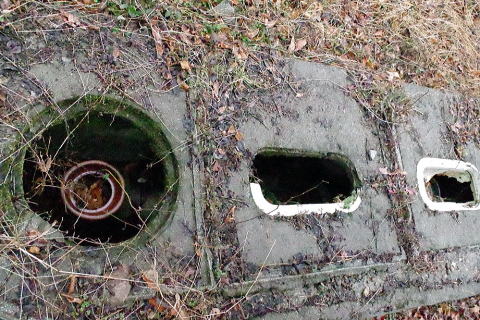
防空壕跡:工廠敷地内の各所に防空壕が設けられていた。平和公園内の防空壕よりは大きく全長18m、本体幅5m、深さ1.4mで出入口は北側一か所、南側2か所でスロープ状になっていて、屋根もあったようだ。
Air raid shelter ruins
Air
raid shelters were set up at various locations within the factory grounds. It
was larger than the air raid shelter in Peace Park, with a total length of 18m,
a main body width of 5m, and a depth of 1.4m, with one entrance on the north
side and two on the south side with slope-shaped entrances, and it seems to
have had a roof as well.
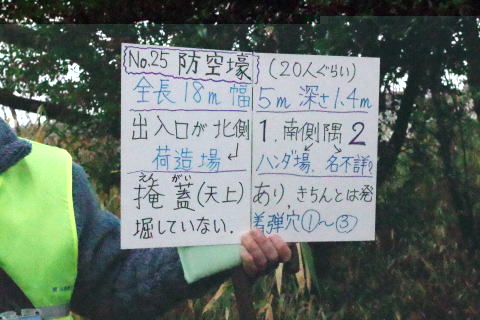
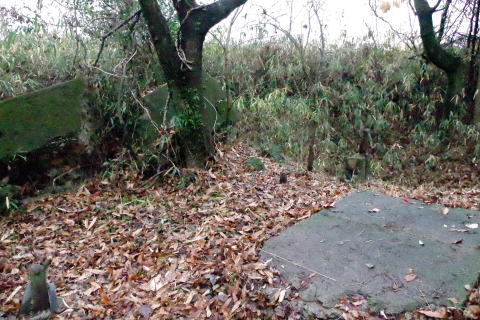
宇宙電波望遠鏡アンテナ:
名古屋大学宇宙地球環境研究所の豊川分室。大きな宇宙電波望遠鏡アンテナを備えて宇宙からの電波を傍受している。
Space radio telescope
antenna
It
is equipped with a large space radio telescope antenna built by the Toyokawa
branch of the Nagoya University Space-Earth Environmental Research Institute to
intercept radio waves from space.
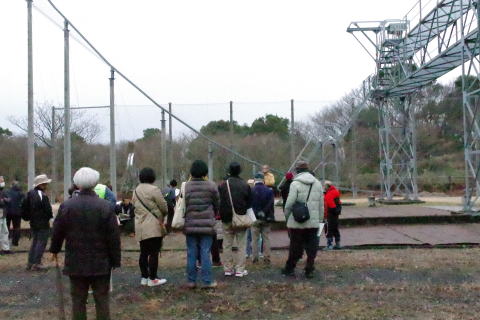
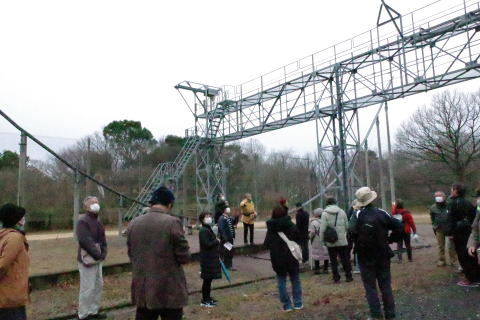


「幅3センチのワイヤーのアンテナ」
<参考資料>
豊川海軍工廠平和公園・ 豊川市平和交流館 (youtube.com)
https://www.youtube.com/watch?v=b0U-PyGFXr8
「ガイドブック豊川海軍工廠」(PDF:6,570KB)
豊川海軍工廠資料集 pdfデータ版(PDF:11,397KB)
kaigunkoshoshiryoshu.pdf
(toyokawa.lg.jp)
豊川市 豊川海軍工廠平和公園内の施設について (toyokawa.lg.jp)
豊川市 豊川海軍工廠について (toyokawa.lg.jp)
豊川市 防空壕跡について (toyokawa.lg.jp)
https://www.city.toyokawa.lg.jp/saijibunka/aoinomon/kaigunkoushouheiwako/boukuugou.html
豊川市 旧第三信管置場について (toyokawa.lg.jp)
豊川市 旧第一火薬庫について (toyokawa.lg.jp)
https://www.city.toyokawa.lg.jp/saijibunka/aoinomon/kaigunkoushouheiwako/kayakuko.htm
平和都市とよかわ表_a (toyokawa.lg.jp)
豊川市教育委員会 生涯学習課前川・細井 TEL:0533-88-8035
戦跡top